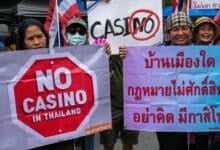China backs Philippines online gambling crackdown

The embassy of China in Manila backed the Philippines government’s plan to crackdown on online gambling and the expulsion of Chinese nationals.
A Philippines Justice Ministry official yesterday announced its decision to shut down some 175 offshore gambling companies and expel around 40,000 Chinese workers in a bid to clean up a haven of crime that envelopes the industry.
Justice Ministry spokesperson Jose Dominic Clavano revealed that gambling itself was not a problem because it generated a lot of taxes for the Southeast Asian country but the criminal activity that accompanied it is a problem.
He said…
“The crackdown was triggered by reports of murder, kidnapping and other crimes committed by Chinese nationals against fellow Chinese nationals.
“The Philippine offshore gambling operators (POGOS) targeted for closure had licenses that either expired or were revoked, for violations like non-payment of government fees, Clavano said, adding the deportation of the Chinese workers would start next month.”
POGOs sprang up around the archipelago country in 2016. They mainly targeted Chinese nationals because gambling is banned on the mainland.
It was reported that at one time or another some 300,000 Chinese nationals worked in the industry. The onset of the Covid-19 pandemic and higher taxes forced them to move on.
A statement from the embassy of China in Manila said…
“Beijing supports the deportation and crackdown on POGO-related crimes. The Chinese government firmly opposes and takes tough measures to combat gambling.”
The Philippines Finance Ministry reported the government scooped about US$123 million in 2020 and US$192 million last year in POGO taxes.
It is estimated that the POGO industry’s exit from the Philippines frees up about 1 million square meters of office space and around US$151 million in lost annual rent.
Real estate consultancy Leechiu Property Consultants in the Philippines reported that the POGOs industry employs over 200,000 Chinese and 111,000 Filipino nationals. They added that the tax revenue delivered US$3.2 billion to the Philippines economy every year.
SOURCE: South China Morning Post
Latest Thailand News
Follow The Thaiger on Google News:


























